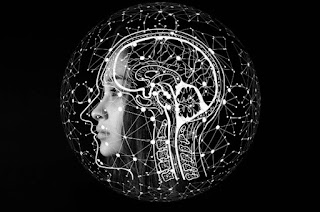Grappling with what we know and believe and with what we hope yet to understand ... well, it can be a difficult struggle. Fortunately, we have science and math and facts we can prove. That only helps with the first part of the struggle, though.
That first part, it's perhaps like cleaning up the house, organizing things into their proper place, each in an appropriate cabinet or drawer or closet. We can sit and relax or gaze out the window at our sensible and predictable world. We understand it, so we don't need to worry.
 Okay, that's just the ground floor. Upstairs, there are questions without such easy answers.
Okay, that's just the ground floor. Upstairs, there are questions without such easy answers.
--We know the universe began, but as best we can tell, it began from absolutely nothing. It sprang into existence without a cause or origin, and science has no answer.
--It's the same with the origin of life. We know life covers the earth, and we understand many the processes. Science tells us it was just a coincidence that life began from the chemistry involved a few billion years ago, but the honest ones admit we have no idea how that happened.
--Then there's our consciousness. We think, we choose, we learn and change, but neuroscience has struggled to find anything other than a deterministic process, like a computer and its program and its inputs. Science acknowledges no free will, no personal control, we're just a result of what was before. The complexity of our awareness is far beyond what science can explain. That's where it ends.
Upstairs, there are things we know and much more that we don't.
--We know we exist, that we have a choice in who we become despite what the science offers.
--We know the rules of society, and we can see that those rules are imperfect.
--We have moral awareness when we stop and think about it, but even then, we can stumble over our own imperfection.
It gets harder.
--We've known since we were children that God is there, and we've held on to that, or we've pushed it away.
--When we heard about how he loves us, we almost understood. When he offered us true freedom, we could see just the edges of it.
--We find ourselves walking uneasily, stepping from this rock of faith to that one as we make our way along.
Science offers little help with such questions.
Every honest believer is at least partly agnostic, understanding that there are some things which cannot yet be known. And there's perhaps a reason behind that. What would we do if an audible alarm sounded every time we sinned, or if He regularly and visibly stepped into the room to instruct us? If we were pressured like that, would there be any real virtue in our choice? Would there be any genuine freedom to acquire our own identity, our own purpose, our own principles and values? I think that we must turn to Him from an honest and open heart.

So, downstairs and up, science and faith, we're reminded that being a rational adult can be difficult. Except we become like little children .... the older I get, the more clearly I see why He would have said that.






.png)









